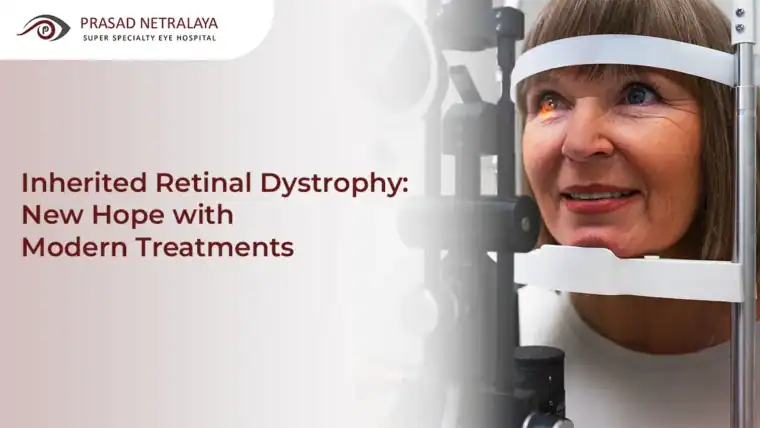When vision suddenly turns blurry, shadowed, or feels as if a curtain is being drawn across your eyes, it could be more than just eye strain—it could be a Retinal Detachment (RD).
Although it affects only about 3% of people by the age of 85, Retinal Detachment is still a true ophthalmic emergency that can cause permanent vision loss if not treated immediately. Acting quickly is critical, and timely treatment can mean the difference between saving or losing sight.
Fortunately, patients in Mangalore have access to advanced treatments, world-class diagnostic tools, modern surgical care, and personalized recovery guidance from skilled retina specialists.
In this blog, we’ll take you through everything you need to know—what retinal detachment really means, the treatments available, the recovery process, and how the right specialist can help safeguard your vision for the future.
Let’s start now!
Table of Contents
Understanding Retinal Detachment
Retinal detachment is a serious condition in which the retina, the light-sensitive layer at the back of the eye, becomes separated from its underlying support. When this happens, the retinal cells are separated from the layer of blood vessels that provides oxygen and nourishment. The longer it goes untreated, the greater the risk of permanent vision loss.
Key Symptoms to Watch Out For:
- Sudden flashes of light
- A sudden increase in “floaters” (tiny specks that drift through your field of vision).
- A shadow or a curtain spreading across your vision
- Blurred or distorted central vision
Related blog: Retinal Detachment: Types, Causes & Treatment.
Retina Detachment Treatment in Mangalore: Modern Options
Thanks to advancements in ophthalmology, patients in Mangalore can now access cutting-edge treatments designed to save and restore vision. A retina specialist will determine the most effective approach based on the severity of the detachment and your overall eye health.
Surgical Techniques Commonly Used:
- Laser Photocoagulation & Cryopexy: Ideal for small tears before detachment progresses.
- Pneumatic Retinopexy: This procedure involves injecting a gas bubble into the eye, which helps reposition the retina and keep it in place.
- Scleral Buckling: A soft band is positioned around the eye to hold the retina in its correct position and aid healing.
- Vitrectomy: Removal of the vitreous gel to allow the retina to settle back into place.
A trusted Retina Specialist in Mangalore will determine the most effective approach based on the severity of detachment and the patient’s overall eye health.
Also, read our guide on: Retina Specialists: What Do They Do?
What to Expect During Retina Surgery Recovery?
Every patient’s healing journey is unique, but understanding what lies ahead makes the process smoother.
Immediate Post-Surgery Phase
- Patients may experience mild discomfort, irritation, or blurred vision.
- Positioning (often face-down) may be required if a gas bubble is used.
Weeks Following Surgery
- Gradual improvement in vision, though full clarity may take weeks to months.
- Strict instructions on physical activity to protect the healing retina.
Long-Term Retina Care in Mangalore
- Regular follow-ups with your specialist.
- Eye drops and medications to prevent infection or inflammation.
- Lifestyle adjustments to support long-term retinal health.
With the right retina surgery recovery plan and consistent retina care in Mangalore, patients can achieve strong visual outcomes.
Why Choosing the Right Retina Specialist Matters?
Timely treatment is important, but so is the choice of your surgeon. An experienced Retina Specialist in Mangalore not only performs the procedure but also ensures you receive comprehensive care—from diagnosis through recovery. Their expertise directly impacts how much of your vision can be preserved.
Conclusion: Your Vision Deserves Expert Hands
Retinal detachment can feel alarming, but with early diagnosis and advanced care, the chances of preserving sight are significantly higher. For those seeking Retina Detachment Treatment in Mangalore, Prasad Netralaya stands as a trusted destination.
With highly skilled retina specialists, state-of-the-art technology, and a compassionate approach to patient care, it offers not just treatment but peace of mind. Choosing Prasad Netralaya means choosing expertise, precision, and personalized retina care in Mangalore—because your vision deserves nothing less.
Protect your eyesight today!
Book a consultation with the retina experts at Prasad Netralaya and take the first step toward safeguarding your vision.
Frequently Asked Questions (FAQs)
1. Who is at risk of retinal detachment?
People with severe myopia (nearsightedness), previous eye injuries, a family history of retinal detachment, or previous eye surgery are at higher risk and should monitor their eye health closely.
2. How long does it take to recover after retinal detachment treatment?
Recovery varies depending on the procedure, but most patients require a few weeks of rest, limited physical activity, and regular follow-up visits with their retina specialist.
3. How successful is Retina Detachment Treatment in Mangalore?
When diagnosed early, Retina Detachment Treatment in Mangalore has a high success rate. Advanced techniques and expert care significantly improve the chances of restoring vision.
4. How long does recovery take after Retina Detachment Treatment in Mangalore?
Recovery time depends on the procedure, though most patients require several weeks of rest and regular follow-up visits. Retina Detachment Treatment in Mangalore ensures personalized aftercare for smooth healing.
5. How can retinal detachment be prevented?
Regular eye exams, managing underlying conditions like diabetes, wearing protective eyewear, and promptly addressing symptoms such as flashes or floaters can help prevent retinal detachment.
Dr. Vikram Jain, M.S. had his medical training (MBBS) from Kasturba Medical College, Mangalore, India. He did his master’s in Ophthalmic surgery from Kasturba Medical College, Manipal. He currently manages the Glaucoma department of Prasad Netralaya hospital.



